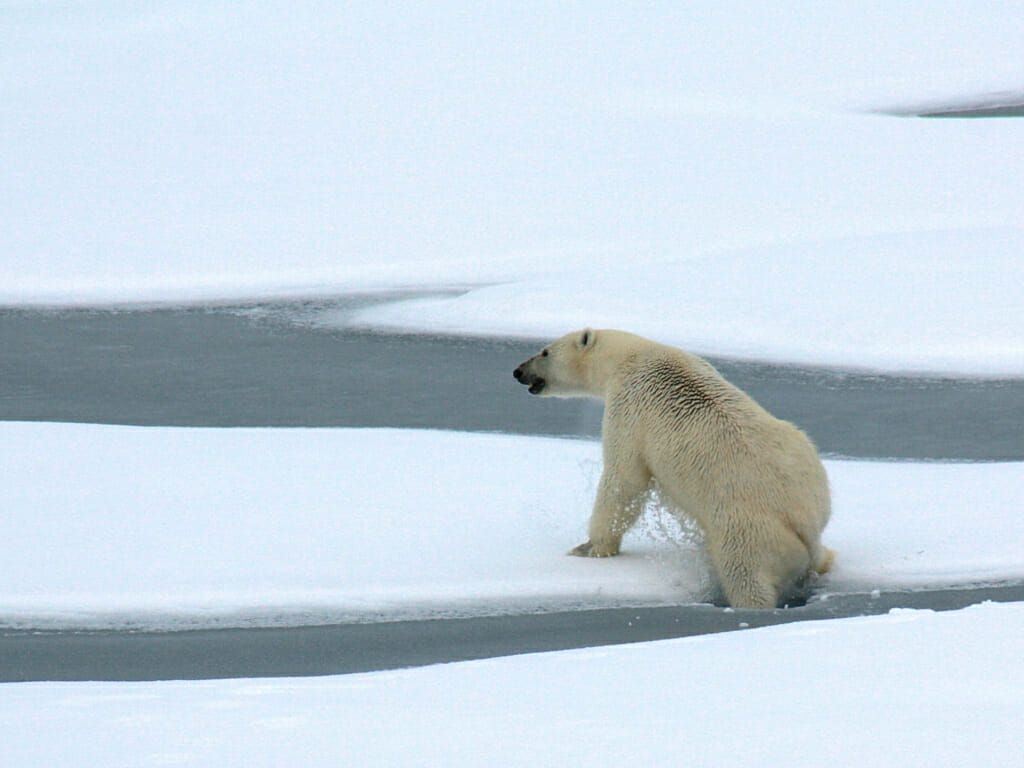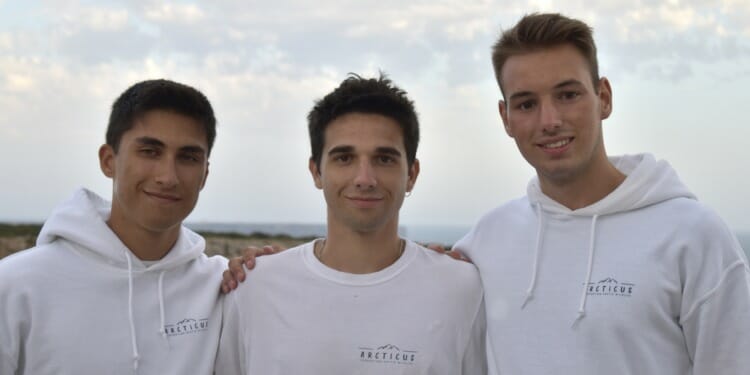Arcticus is a lifestyle brand dedicated to supporting and protecting the Arctic environment and its wildlife. 25% of sales of their t-shirts, reusable water bottles, and bracelets are donated to NGOs such as WWF to fund conservation projects and raise awareness about the impact climate change is having on this fragile ecosystem. We sat down with Manuel Lopez Joya, one of Arcticus’ three young founders – all of whom are still in university – about the importance of the Arctic, the challenges of measuring impact in such an extreme environment, and the dedication needed to build a business while still in school.
You started Arcticus with two of your friends you met at school in the UK, Christian Hess and Andrew Lewis Martinez. How did the idea for Arcticus come about and how did you juggle building your own company with your commitments as students?
When I met the co-founders we were just 16. We shared a lot of interests, among all of them was a drive for business and a passion for sustainability and environmentalism. It felt natural to combine them and this is what led to the foundation of Arcticus when we were 19. We wanted to create a brand based on social media that could help support conservation efforts – something meaningful that had an impact.
It’s definitely not easy to develop a fast growing business as full time students at university. I study international business, my co-founders study medicine and mechanical engineering – all of them are really demanding courses. We work long hours and sacrifice all our free time. We’ve been doing this for three years and we love it. That’s how we manage to do it. We have a passion for what Arcticus means and what it’s developing into, and a passion for our community, who pushes us to do more and do better. My advice to anyone who wants to do anything like this is to really love it.

Arcticus’ vision is to create lifestyle products that help support specific programs in the Arctic. You donate 25% of your profits to specific programs, projects, and activities across the Arctic Circle run by major NGOs, such as WWF. Why is the Arctic the main focus of your advocacy?
When I thought of climate change and the impact it’s having, the first thing that came to mind is the arctic. It’s the first environment to feel the impact and it’s so important to focus on its conservation. A lot of brands plant trees and collect trash from the ocean, but no brands focus on the conservation of the Arctic and that’s because it’s really hard to do. The costs are huge, it’s an expansive area and extremely hard to measure impact, you don’t even know where to start! Very often to feel that your actions are insignificant, that you’re not playing an impactful role.
But that’s not how we think, we believe anyone can have a positive impact in the world and we want to empower communities to do this. We wanted to build a brand that people love and at the same time supports causes that no other brand allows them to support.
Can you talk a little bit about the programs and initiatives in the Arctic that you help fund? How do you go about selecting the NGOs you work with, what do you look for in these partnerships?
Partnering with NGOs as a young company is easier than people think, and we have found their openness to collaboration overwhelming. Anyone who wants to get involved with an NGO should just reach out as the vast majority are looking for help from people who share their cause. The challenge is finding specific programs to support.
What we look for when deciding what programs to support is impact – something that can hopefully be measured and something that our audience can see. We support a wide range of projects, from big macro level programs, like WWF, to middle tier projects and even very niche ones.

For example, we have a partnership with the Whale and Dolphin Conservation to support the first ever beluga whale sanctuary, in Iceland, which returns former captive beluga whales to their natural habitat. It’s a very different approach to wildlife conservation to what we would support with WWF. And we just recently started a partnership with Hearts in the Ice, a very small program run by two women who spend months on end in the Arctic to collect samples for scientific research.
You mentioned that it’s important for your audience to see your efforts – how do you communicate this to them?
It’s very important to measure impact but as I said, that is very hard to do with the Arctic, you can’t count trees or the amount of trash collected. Our funds help support the diet of the beluga whales, so we can quantify the amount of fish, but at the end of the day, what’s really important is to share the overall purpose of the program. We want to motivate our audience to realize that anyone can make an impact, to be inspired, for example, by the women behind Hearts in the Ice, which at the end of the day is a citizen-led initiative that is proving to be incredibly useful for the scientific community.
You offer a selection of t-shirts, hoodies, water bottles, and bracelets made of volcanic and agate gemstone beads. Why did you choose these particular products, and do you have any plans of expanding your offerings?
Our ultimate goal is to create products that people love, feel attached to, and want to use. We are really evolving the way we develop products; we want our products to not only look good and help with donations, but to also have further utility in sustainability. The bottle is the perfect example – not only does it help with donations, it moves people away from single-used products.
We’re also putting a lot of emphasis on the materials we use. The lid on our bottle, for example, is certified sustainably sourced bamboo, the packaging is FSC certified, and it has by far the lowest percentage of synthetic material used in any reusable bottle.
We are also launching a new clothing line in 2022 which will be a whole rebranding of our current clothing, made entirely from organic cotton.

With the adoption of the UN 2030 Agenda and the 17 Sustainable Development Goals in 2015, sustainability is an essential guiding principle for businesses everywhere. A lot of brands are hopping onto the sustainability bandwagon, but it’s a learning process. What were some of the key learnings from your own path to sustainability and what are some of the future challenges you anticipate for your brand?
As you said, it’s a learning process, we found this out from experience. We can be making great donations but if there are big inefficiencies in the way we produce, or handle our waste, or our logistics, then we are diminishing our purpose and not having a positive impact.
All sustainable brands have made mistakes, the way we get better is by being super critical of what we do and revising every little activity. This extends from the materials we use to, to the packaging, even our suppliers – it’s important that we are aligned on values. We also hope to be carbon neutral certified by the end of 2021. This is an example of how we’re always trying to level up and be better, all brands need to be doing this.
Editor’s Note: The opinions expressed here by Impakter.com columnists are their own, not those of Impakter.com. — Featured Photo: Acrticus’ founders, from left to right: Manuel Lopez Joya, Andrew Lewis Martinez, and Christian Hess. Photo Credit: Manuel Lopez Joya










